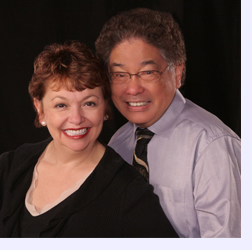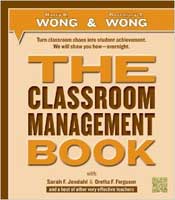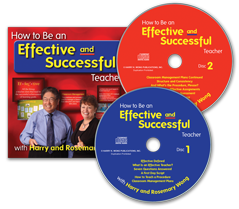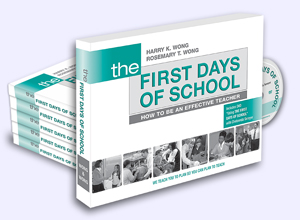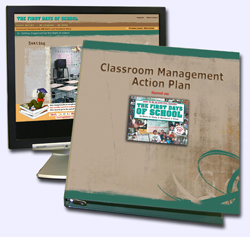|
 |

Special to the Gazette
September 2013
Prevention: The Key to Solving Discipline Problems
Prevention, Not Intervention In July, we spoke to a group of 1,600 educators at the National Conference on School Discipline in Las Vegas. We are sure that most came wanting to know the answers to these basic questions:
Instead of answering these questions, we shared how to PREVENT the situation from happening rather than suggestions on how to INTERVENE once the problem occurs. Teachers who want intervention expect the administration to intervene for them. They expect the counseling staff to provide answers for them on how to deal with these kids; they expect a packaged discipline program to be installed at the school; they expect someone or something to do something to take care of the problem. Behavior problems can mostly be prevented by having a classroom management plan with procedures. Procedures tell a student what to do. If students know what to do, Effective teachers implement a classroom management plan that prevents problems from occurring in the first place. In an ineffectively run classroom, energy is used to In an effectively run classroom, energy is used to In other words, effective teachers prevent problems before they occur, rather than react after a problem occurs. The Three Cs Classrooms with an abundance of misbehavior problems have as their signature the Three Cs:
If the student does not comply, office intervention or in-class scolding is used. Coercion is used to control the class until submissive behavior is evident—anything for the teacher to survive. Classrooms that are free of misbehavior problems succeed because they give children structure, focus, guidance, and direction. This is how effective schools and classrooms are created. Effective classrooms are not created by using rules. Rules are essential in games because they are meant to control. Rules do not inspire. If your purpose is to control, then rely on rules. However, if your intentions are to inspire and teach, then share your expectations and teach procedures. Children will rise to the level of your expectation of them and their abilities. Rules and Punishment Don’t Work We recently received a letter from a middle school teacher who asked for help in dealing with the problems at her school. She called her school a miserable place for teaching and learning. Student misbehavior was out of control. Fights erupted. Fed-up teachers threw students out of class so often, long lines snaked outside the principal's and assistant principal's doors. The miscreants in those lines, waiting to be punished for their classroom behavior, often got into it with one another, compounding their original offense with yet another hallway fight. Suspended students often went home, got their bikes, and came back. They would ride up and down the sidewalks outside, hollering for their friends to come to the windows to admire their freedom. It was cool to be bad, which only infuriated the teachers more. Her school’s philosophy was based on discipline, with adults punishing a child into compliance with rules. The punishments did not improve behavior; it only stopped it temporarily until the problem raised its ugly head again. Punishing for bad behavior does not cultivate cooperation or respect. Trying to rule over kids by threatening them with a nasty consequence invites rebellion and resistance. Punishment might work as a last resort. But in general, its costs outweigh the benefits. The school was caught in a cycle of retributive discipline. Adults punished the kids. Kids found obnoxious ways to punish the adults. And so it went on and on and on and on. Miserably. Procedures and Classroom Management Yes, rules are necessary. But, they do not form the basis of how a school or classroom operates. Rules are just a minor part of an overall management plan. An effective teacher has a very simple discipline plan, with no more than five rules (see Chapter 18 in The First Days of School). The simple discipline plan is part of a Classroom Management Plan that is filled with procedures for what to do in the classroom (see chapters 19 and 20 in The First Days of School). 
If you are not familiar with what a classroom management plan looks like, please see pages 213–218 in The First Days of School. This is the classroom management plan of Sarah Jondahl, a teacher we met when she was only six weeks into her teaching career. When we visited her classroom, there were no discipline problems. Her students were actively engaged in learning. They all knew what to do. Sarah is now in her 15th year as a very effective teacher. She says, “My classroom management plan is shared with my students on the first day of school and I refer to this plan constantly. The students know what to do in the classroom, as well as how I expect them to act and to treat one another . . . I do not have any major behavior problems with my students. Most importantly, I have high academic results from my students.” It Starts on the First Day 
Oretha Ferguson of Southside High School in Fort Smith, Arkansas, says, “On the first day of school, I stood at my classroom door to welcome my students. I observed as they quietly walked in the room, sat down, and began the bellwork.” Meanwhile, Oretha watched as another teacher's class was in total chaos. As the teacher tried to quiet them to begin class, Oretha thought, “What a waste of time!” Unlike the other teacher, Oretha had procedures in place before her students walked in the door on the first day of school. Later in the week, the other teacher commented to Oretha how her students were “always so good!” Oretha explained to the other teacher, “It’s not the students; it’s the procedures that have been proven to work. Procedures help me manage my class so that I can be an effective teacher.” Why Not Discipline? 
C. M. Charles has written one of the premier books on discipline, Building Classroom Discipline. First published in 1981, it is currently in its 10th edition. Over the past 30 years, Charles has modified each edition to reflect the current, in vogue discipline programs. Each edition presents a plethora of discipline plans, and through the years these plans have come and gone like reality TV shows, diet plans, and social media apps. Many educators believe that the hyped, new and improved discipline programs will bring a miracle improvement in student behavior. What we teach is classroom management, and classroom management is not the same as discipline. The latter is behavior management, the correction of inappropriate or nefarious behavior. Classroom management is how a teacher organizes classroom practices and procedures to manage a classroom so that instruction and learning can take place. With proper classroom management, the students will know what to do to learn and succeed. The #1 problem in the classroom is not discipline; it is the lack of procedures and routines (see page 165 in The First Days of School). C. M. Charles saw the efficacy of this concept and contacted us when he revised his 8th edition as he wanted to add our approach to his book. We initially declined his invitation as what we teach is not a discipline plan; it is a classroom management plan. Charles responded as follows:
Be a Proactive Teacher The criminal system is reactive; it acts after a crime is committed. An effective classroom is proactive; it has procedures in place to prevent deviations from expectations. The effective teacher is a PROACTIVE teacher. These teachers put plans into action. They have classroom management plans filled with procedures for doing things in the classroom; they have lesson plans filled with various strategies to help children learn; and they have expectation plans that foster and support a positive attitude in their students. The ineffective teacher is a REACTIVE teacher. The ineffective teacher does not have a classroom management plan. As problems occur, the teacher repeatedly reacts from one problem to the next. There is no change or improvement, just battling the kids every day. For your sanity, it is not wise or healthy to run from one problem to the next, repeating this same scenario every day. The reactive teacher is constantly looking for a one-shot, simple solution to take care of the problem—now! Even worse, the reactive teacher asks, “What do I do to this kid?” Please, never do something to someone. We are in the profession of doing things for someone. In order to do something for someone, you must inspire action, motion, and change. Effective teachers achieve this using a well-organized classroom management plan that structures the classroom so the students know what to do to succeed. Research shows that being proactive has its benefits. We’ve known this for decades. Dedicating time to implement plans and procedures in the first week of school will set the tone for the rest of the school year:
Don’t Waste Time John Goodlad completed a comprehensive study of over 1,000 classrooms, from high schools to elementary schools, in thirteen communities, in seven sections of the country. He recorded classroom time spent on instruction.
For 1,000 classrooms, the average time spent on instruction was This percentage equates to between 8 and 9 hours per week of lost instructional time. In a given school year of 180 days, an average of 25% of classroom time is not spent on instruction. Goodlad suggested that to improve student performance, schools should provide deliberate, systematic attention to improved teaching of procedures and more thorough and efficient use of time. He thought that 10% more instructional time could be easily added by most teachers with effective classroom management and lesson mastery proficiency, and it would have more positive results in student performance than a large infusion of another curriculum program or federally funded programs. Goodlad’s recommendation of effective classroom management informs students ahead of time how to work productively in class (such as bellwork, transition, and group work), so that no time is wasted and more time can be devoted to instruction and learning. With a Classroom Management Plan filled with procedures for what to do in the classroom, you, too, can decrease discipline problems and increase time available for instruction. An Exciting Announcement We are excited to announce our forthcoming book, We will be sharing more about the book in the columns leading up to the release of the book. In the meantime time, click here for a “Sneak Peek” into the book and a special promotional offer. Sarah Jondahl and Oretha Ferguson, the teachers quoted in this month’s column, are our two co-authors of the book. Plus, we’ve included over 100 very effective teachers and how they do things in their classrooms for student success. We’ve heard from you. We’ve been inspired by you. And, we know how practical and useful THE Classroom Management Book will be for setting up a very successful classroom so you can be the effective teacher you dreamed you could be. This book will be the plan for your success.
|
|||||||||||||||
| |||||||||||||||

 How do we reduce the number of discipline problems in our school?
How do we reduce the number of discipline problems in our school?